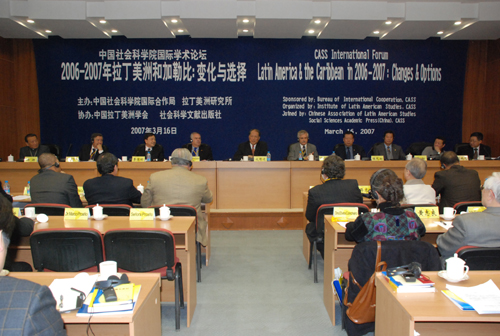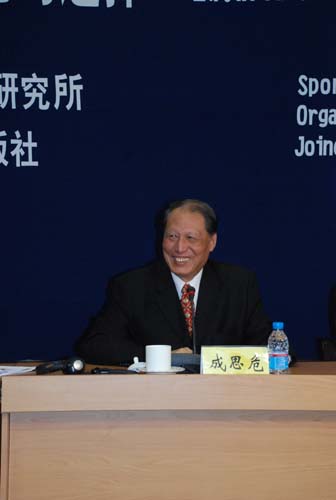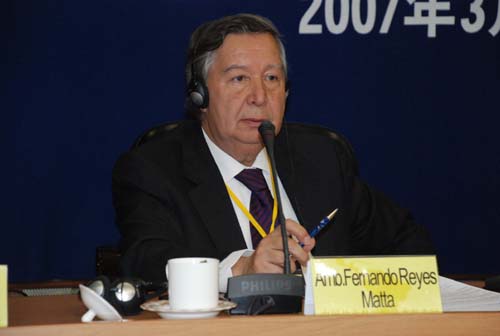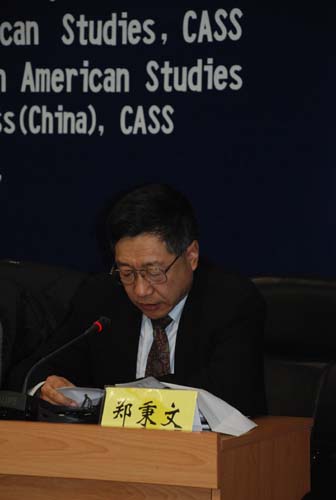
"CASS International Academic Forum: Latin America and the Caribbean (LAC) in 2006-2007" was open on March 15th, 2007 in Beijing at the Academic Lecture Hall of the Chinese Academy of Social Sciences (CASS). Under the theme of “Changes and Alternatives”, this year’s forum was developed in three sections: Implications of LAC’s Alternatives for China, Dynamics of LAC’s Political Situation in the Post-election Era, and Characteristics and the Trend of Current Situation in LAC. It is the third session of the CASS International Academic Forum on LAC’s situation following the previous two in 2005 and 2006. Mr. Yang Yang, Director General of the Bureau of International Cooperation (Bic) and Mr. Zheng Bingwen, Director General of the Institute of Latin American Studies opened the forum and co-chaired the opening ceremony. During the inauguration, Mr. Cheng Siwei, Vice-Chairman of the Standing Committee of the Ninth & Tenth National People's Congress of China and President of the Association of China-LAC Friendship, Mr. Chen Fengxiang ,Vice-Minister of the International Department of the Central Committee of the Communist Party of China, Mr. Zeng Gang, Director General of the Department of LAC Affairs, the Ministry of Foreign Affairs of the People's Republic of China made keynote speeches. Around 200 people came to the gathering, among them there were officials, scholars from China and abroad as well as diplomats accredited by LAC countries and Spain to China. Mr. Li Shenming. Vice-President of the CASS addressed the audience on behalf of the host institution,

In his speech, Mr. Cheng Siwei highly appreciated the forum and its implications. He said this year’s session is bigger in magnitude and richer in content than the previous two. The succession of the yearly sessions has turned it into a glamorous annual gathering on LAC’s situation, an important contribution to the development of Sino-LAC relations and a manifestation of the growing interest in LAC of the society.
The Vice-chairman then made an in-depth analysis on Sino-LAC relationship. He believes that China’s rise has brought more opportunities than challenges to LAC countries, China’s development is in favor of the development of LAC countries, to Sino-LAC relationship and to the friendship between the peoples of the two sides. In fact, he said, the changing situation of the world turned out to be the best opportunity to further promote Sino-LAC relations and to deepen our trade cooperation. He also pointed out that the shift of China Threat Theory, a hot topic several years ago to the Theory of China Responsibility throughout the press circles of the world is a great progress because it suggests the changing of people’s perception of China and the positive role China’s playing to the development of the world. He emphasized that people to people exchanges are getting increasing importance in deepening the relationship between China and LAC. It is of invaluable significance for a harmonious world and the common development of China and LAC to strengthen the overall Sino-LAC relationship and to deepen bilateral economic and trade ties and it is in the interest of the vast majority of the people to seek a relationship based on mutual benefit and win-win results.
On the regional situation, Cheng noted, great changes have taken place in LAC’s economic, political and social pictures and diplomacy in recent years. The splits and combinations among parties further complicate the political picture of the region. However, generally speaking, the political parties of LAC are converging to the middle positions as their political points of view are coming closer. Nowadays, development tops the priorities of LAC countries whereas the economy, pushed greatly by foreign trade, is taking a turn to the better. These changes provide us with larger room to develop a sustainable Sino-LAC relationship, which in essence will benefit China’s economic development.
In his speech, Mr. Li Shenming, Vice-President of CASS, reviewed and examined LAC’s great changes in 2006. According to him, the growing left-wing political and social forces are changing the political picture of the region as well as the political, economic and social trends in various countries. In fact, their rise reveals a region-wide political aspiration. He believed that the 14 general elections conducted in a few LAC countries in 2006 not only reflect the cut-throat competition among the political parties and forces but also determine largely the political dynamics of these countries and even of the region as the whole. Moreover, they will exert strong impacts on the economic and social development in these countries. Therefore, in order discover the trajectory and the intrinsical rules of LAC’s political, economic, cultural and social development, it is necessary to deepen our studies on these general trends taking the political and social movements of the left-wing forces as a starting point. He said, the neoliberal reforms carried out in 1980s and 1990s across the region following recipes based on the Washington Consensus failed to solve but worsened the inherent political, economic and social contradictions of the region by turning up more problems. It is in response to such a context, have the left-wing political and social movements reemerged as an alternative.
Li added that the socialist and left-wing thoughts are reemerging somewhat in LAC as what they are doing across the world. Although the current left parties and social movements in LAC are made of different political and social forces holding very different political points of view and claims, they share the following positions: to criticize the neoliberal reforms, to promote political reforms through civil participation, to widen the democracy so as to realize social justice through social reforms, to fight against the west-centered globalization and to build up a new international political and economic order on the basis of rationality and justice. In fact, a great change of governing philosophy in these countries is behind these calls. It makes a wider margin for LAC countries’ decision-making, governance and policy maneuvering. Obviously, this situation allows LAC’s governments to adjust their policies according to their national interests and to explore new development models suited to their own national conditions.
To the Vice-Minister Chen Fengxiang, both the title and the subtitle of this forum perfectly reflect the characteristics of the development of LAC and China and address the demands posted by the development process in these two regions. Actually, they have become a focus of attention of the academic communities both of China and abroad. He said, it is in LAC, one of the pioneers of modernization in the “third world”, where the theories of development and the ISI development model gestated and it is in LAC where the neoliberal policies were put into test. LAC’s pursuits and explorations during the process of modernization provide the vast developing countries with extensive experience and invaluable lessons. China and LAC should learn from each other. While LAC’s development experience and lessons may serve China as inspirations for our harmonious society building-up and a reference for our construction of socialism with Chinese characteristics, China’s successful experience in its reform and opening-up may be shared by LAC. He noted, in the past year, Sino-LAC relations made encouraging progresses. In 2006, both LAC and China experienced great changes. While remarkable changes took place in the political, economic and social arenas across the region and LAC peoples made options according to their own interests China’s economic and social picture also changed significantly. Concluding the remark, he raised the following questions of strategic significance: How will China-LAC relationship evolve under these changes and alternatives? How to strengthen and deepen this relationship?
Following the Vice-Minister Chen, Mr. Zeng Gang made an overall summary on the characteristics of LAC’s situation and the development of China-LAC relations in 2006. (1) Political stability was generally kept. While democratic political systems were growing mature and further consolidated, the left-wing forces continued on the rise and most of the left governments adopted moderate and pragmatic domestic and foreign policies. (2) Latin American economy entered a new cycle of growth but structural obstacles hindering economic development remained. (3) Regional integration, an option made by the region in front of the challenges posted by the globalization continued advancing in ups and downs. (4) U.S.-LAC relationship was getting relaxed because, while the U.S. managed to restructure its foreign policies towards LAC in order to maintain its traditional influence and control over the region LAC countries were getting increasing independence and autonomy in face of the old “backyard” keeper, The majority of the left governments, following pragmatic policies, lowered the consideration of ideological elements in their relations with the U.S. taking cooperation as the top priority. He stressed the good momentum of China-LAC relations was kept in 2006. It is reflected by: Firstly, frequent exchanges of high rank officials contributed much to reinforce Sino-LAC relations. Secondly, trade and economic cooperation was expanded further. It is becoming increasingly consented among LAC countries that the “China factor” is positive for LAC’s economic growth. In practice, the theory of “China Opportunity” is heating up in the region. Thirdly, China and LAC kept close cooperation in various multilateral arenas while China’s relations with a few regional organizations of LAC were strengthened continuously. (4) Annual talks on LAC issues between the U.S. and China kicked off. It is widely believed theses talks may reinforce mutual understanding, increase mutual trust and disperse distrust and therefore will contribute to developing healthy and stable China-U.S. and China-LAC relations, which are definitely in the interests of the concerning parties .
In the following section entitled “Implications of Latin American Alternatives for China”, Colombian Ambassador Guillermo R. Vélez Londoño, Brazilian Ambassador Luiz Augusto de Castro Neves and Chilean Ambassador Fernando Reyes Matta made keynote speeches on each country’s evolving situation and their relationship with China.
Colombian Ambassador Vélez indicated, Uribe’s government implemented pragmatic neoliberal policies. The guerrilla and poverty are the biggest problems of the country. He said, every country has the right to choose its governing style no matter whether it is the right-wing of left –wing in office. With regard to bilateral ties, he clarified, it’s wrong to believe China floods Colombian markets with cheap goods because many investments in Colombia are from hi-tech enterprises of China. To conclude his remark, he extended warm welcome to more Chinese companies to invest in his country.
Brazilian ambassador Luiz Augusto stressed, LAC is a heterogeneous and complex region where all countries have their own peculiarities and therefore they should be examined individually; The strong influence of the U.S. across the region is one of the reasons for which LAC countries are trying to get closer with other regions; nationalism prevails the whole region, though it appears in different forms according to different historical periods; the meaning of the left in Latin America has changed greatly, differing greatly from “the left” in Europe. Briefing on China-LAC relations, he highly commented China’s development. He said, ideological differences between China and LAC have never affected fundamentally our relationship. In fact, China and LAC are getting everyday closer. Talking about challenges to Sino-LAC relationship, as an example, he put that some enterprises in a few highly-industrialized LAC countries think they have been harmed by Chinese exports. At the end of his speech, he reiterated China’s important position in Brazil’s foreign policies.
Chilean ambassador Reyes said, as China and Latin American countries are committed to building a new-type relationship toward 21st century, both are attaching more attention to each other. As a result, neither of them would ignore the other’s importance in its making of development strategies; Although China and LAC may differ in interests we share the same points of view on how to insert into the globalized world; China needs LAC’s resources, and LAC needs China’s help; China and LAC are committed to a multi-polar world, it’s both a consensus and a common interest; the theory of “21st Century Socialism” is progressiveness-based and LAC countries are trying to minimize the negative consequences of “Washington Consensus” , they hope promote cooperation with China; China’s “harmonious society” and Chile’s “solidary society” share many similarities. Mr. Reyes concluded that tow pieces of China’s experience are worth of learning for LAC countries, the first, national development strategies should be long-term oriented; the second, it’s necessary to know the history and understand people’s wishes. Ruling parties shall learn from the CPC on how to listen to their people.
In the section of “the Dynamics of Latin American Political Situation in the Post-election Era”, former Vice-President of the National Congress of Ecuador, Marco Proaño Maya, Senior Research Fellow of UNAM Elvira Concheiro and CASS Member Su Zhenxing spoke respectively on the “ruling crisis in the process of democratic reform”, “ challenges faced by Mexico and the left of Latin America”, and “changes within the regime: basic direction of the left of LAC” .
During the discussion, Proaño accused developed countries and the IMF of the culprit of LAC’s dependence to the outside world, the enlarging rich-poor gap and piles of foreign debts. He indicated the globalization is not only political and economic globalization, but also the globalization of hypocrisy and apathy. He believed the increasing number of Chinese visitors would become an important source of income for LAC countries. Concheiro then commented, the neoliberalism worsened the inequality and economic development in the region; the left in Latin America was growing stronger but still unfledged therefore, to get reemerged, it must tackle such serious challenges.
Professor Su Zhenxing believed that the rise of the left in LAC could be attributed to three reasons: faults in the previous process of development, the disappointing consequences of the neoliberal reform and various institutional defects. He said the fact that the vast peoples including a large number from the middle class voiced intense calls for change was the very political and social basis of the reemerging left. According to him, the left of LAC can be classified into “the revolutionary left” and “the democratic left”. In reality, most social changes in LAC along the the 20th century took the form of reform instead of revolution and were mainly led by two typical types of governments, one is civil and the other military. The democratic left implemented changes mostly “within the existing regime” rather than abandoning them, this is determined by their political positions. Although among policies adopted by the current left governments are either moderate or radical, even the most radical ones remain within and try to improve the framework of “changes within the existing regime”.

The final section “Characteristics and Trend of Latin American Political Situation” was unfolded through four theme speeches on “the new political dynamics in the general stability”, “sustainable economic growth”, “relatively stable society and serious challenges” and “the diversification of LAC’s foreign relations”. Major points of view of the four speakers are: (1) in the political arena, remarkable changes took place in the general context of relative stability. The splits and combinations of various political forces are turning increasingly complicated, the differences among the left-wing forces are becoming more obvious and political reform remains an arduous task. (2) As for the economic situation, a stable and continuously improving macroeconomic performance provides a comfortable environment and relatively solid basis for economic growth. In spite of various policy adjustments along the year, problems like how to speed-up the growth, how to cope with international uncertainties and how to improve the domestic investment environment still need to be addressed. (3) The relative social stability co-exists with sporadic conflicts. LAC’s social development is entering a key period. (4) LAC countries’ diversified diplomacy bears remarkable fruits although their foreign policies are getting increasingly diverged. Despite of the worsening contradictions between the US and Latin American countries, the influence of the US in LAC remains intact.

During the following debate section, attendant scholars put forward and discussed a few candent issues, like the meaning and prospects of Hugo Chavez’s “21st Century Socialism”, the roots of Latin America’s relatively rapid economic growth in 2006, how LAC countries break the bottle neck of insufficient investment, if the rise of the left explains the worsening US-LAC relationship, prospects of U.S.-LAC relations, major contradictions within LAC countries and to what extent may China’s economic development affect Latin America, etc.





